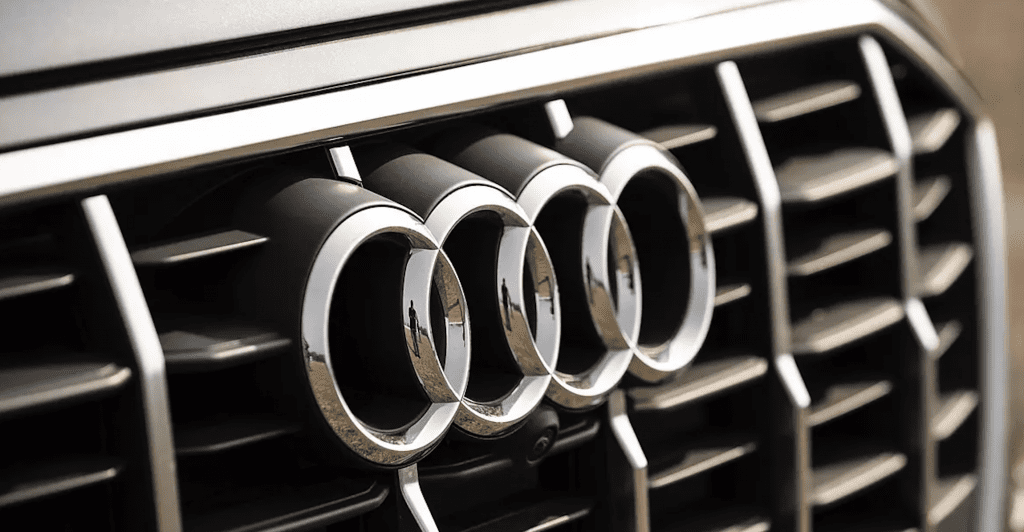An opinion from an Advocate General of the Court of Justice for the European Union (“CJEU”) in a trademark case over replacement parts is an interesting one for car-makers and companies outside of the auto market, alike. In her opinion this fall, Advocate General (“AG”) Laila Medina sided with a wholesaler of spare car parts in a case waged against it by Audi, which has argued that its four-rings logo trademark was infringed by way of the defendant’s unauthorized sale of spare car parts, including replacements for the radiator grille on older Audi’s A6 models (those made between the 1980s and 1990s).
Some background: Audi first filed suit against the defendant (an individual identified exclusively by the initials, GQ) in a district court in Poland in 2017 on trademark infringement grounds and sought an injunction to block the defendant from offering up the allegedly infringing grilles, which closely mimic Audi’s original grille – right down to the cut-out for inserting and mounting Audi’s four-rings logo. Since the outline of the carved-out portion of the grille mirrors that of Audi’s logo, the German automaker lodged trademark claims against the defendant.
The Regional Court of Warsaw referred several questions to the CJEU for a preliminary ruling. Among the questions that the CJEU was tasked with deciding: Whether Article 14(1)(c) EUTMR – which allows for referential trademark use without prior authorization from the trademark owner – prevents Audi from prohibiting a third party from using in the course of trade a sign that is identical or confusingly similar to its EUTM, namely on spare car parts where that sign constitutes a mounting element for a car accessory. And if so, what evaluation criteria should be used to determine whether the use of the EUTM is consistent with honest practices in industrial and commercial matters?
The AG’s Decision
Considering the first issue, AG Medina found that the carved-out section of the grille the does not amount to referential use under Art. 14(1)(c) EUTMR because it is provided exclusively as a means for inserting and mounting Audi’s logo. According to the AG, unlike other types of spare parts, only a radiator grille that is designed to mimic the original radiator grille “makes it possible to replicate the car’s original appearance.” Against this background, AG Medina held that the CJEU could find that the mere silhouette of Audi’s EUTM, as part of a “faithful reproduction of an original radiator grille and with the sole technical purpose of inserting and mounting Audi’s emblem,” serves a technical function, and does not function as a trademark.

Answering the second question, AG Medina stated that the defendant’s use of the Audi trademark by way of the rings-shaped carve-out “does not entail a discredit [to] or denigration of [the Audi] mark; second, the [defendant] has taken the necessary steps to indicate that the products were manufactured by it” – presumably by way of disclaimers – “and to ensure that they will not be regarded as imitations or reproductions of the original part;” and third, “the manufacturer or seller of spare parts is subject to a duty of diligence [regarding] compliance with the conditions required to ensure that downstream users comply with honest practices in industrial or commercial matters.”
The matter was sent back before the Regional Court of Warsaw, which will apply the determinations of the AG to the facts at hand.
Pushes for Right to Repair, Claims of Anti-competition
The case is an interesting one, as it comes amid an enduring rise of issues around product repairs – ranging from cars and electronics to luxury watches – and in many instances, replacement and/or spare parts are part of the equation. Primarily, the case coincides with a push in the U.S. and beyond on the right-to-repair front, with New York, for example, becoming one of the first states in the U.S. to pass a right to repair law in 2022. The state’s Digital Fair Repair Act was enacted this year, along with separate right to repair legislation in Colorado, California, and Minnesota.
In addition to growing momentum among state legislatures to provide consumers with broader repair rights, the Federal Trade Commission (“FTC”) has signaled a similar intent on more than one occasion, announcing in October 2022, for instance, that it had approved final orders in cases against Harley Davidson, Weber-Stephen Products, and MWE Investments, accusing the companies of including terms in their warranties that stated that product warranties would be void if customers used independent repairers or third-party parts, in violation of the “anti-tying” provision of the Magnuson-Moss Warranty Act and the FTC Act.
At the same time, the Audi case comes as companies face pushback over restrictions on how their goods can be repaired/serviced, with no shortage of companies mandating that the addition of third-party parts will transform an otherwise authentic good to one that is outside of the scope of a company’s warranty. The luxury watch market comes to mind here, as companies in this space are known to require that service/repairs be performed only with their brand-name parts and by authorized parties in order to ensure that relevant warranties and warranty coverage remains intact.
Other companies have faced lawsuits of their own, with Tesla, for one, being accused in an anti-competition suit of “designing its vehicle warranties and related policies to discourage Tesla owners from obtaining parts or services anywhere other than Tesla,” thereby, monopolizing the markets for vehicle maintenance and replacement parts. In their complaint, the plaintiffs argued in the consolidated class actions that Tesla “leverages its market power in the EV market . . . to coerce [consumers] into purchasing Tesla Repair Services and Tesla-Compatible Parts,” and also “leverages its power in the Tesla repair services market to force consumers into buying Tesla-compatible parts, and leverages its power in the Tesla-compatible parts market to force them into purchasing Tesla repair services only through Defendant or its authorized collision centers.”
Granting Tesla’s motion to dismiss in November, Judge Trina Thompson of the U.S. District Court for the Northern District of California found that, among other things, the plaintiffs’ claims fail because they did not plausibly allege that the Tesla repair services market and the Tesla-compatible parts market are “cognizable single-brand aftermarkets.” Not over just yet (the court granted the plaintiffs leave to amend their complaint, which they did on December 8), this case and others like it are worth keeping a close eye on, as the legislative and regulatory landscape for repairs and/or replacement parts continues to evolve.
The case is Audi AG v. GQ, Case C‑334/22.
Updated
January 25, 2024
The Court of Justice for the European Union has sided with Audi, holding that “a car manufacturer can prohibit the use of a sign identical or similar to the trade mark it owns for spare parts … when the spare part contains a component designed to attach the manufacturer’s emblem and whose shape is similar or identical to that mark.”











